Top Decentralized Perpetual Exchanges Compared
.webp)
Summary: Decentralized perpetual exchanges (perp DEXs) are redefining crypto derivatives trading through full asset custody, transparent on-chain settlement, and access without KYC barriers.
In 2025, decentralized perpetual exchanges process nearly $1 trillion in monthly volume, capturing about 18% of the global perpetual futures market driven by improvements in speed, liquidity, and execution quality.
This analysis ranks the top decentralized perpetual exchanges by liquidity, fees, open interest, leverage, and reliability:
- EdgeX: Leading Perps DEX in 2025 by Throughput and Transparency
- Hyperliquid: Most Liquid Platform with Deep On-Chain Markets
- Lighter: Fastest zk-Powered Perp DEX on Ethereum
- ApeX: Multi-Asset DEX Offering Tokenized Stocks and 100x Leverage
- Aster: Binance-Backed High-Leverage Exchange with Multi-Chain Support
- Drift: Leading Solana-Based Perp Exchange with Hybrid Liquidity
- dYdX: Longest-Running and Most Trusted Decentralized Perp Exchange
EdgeX ranks as the best decentralized perps DEX, offering unmatched execution, 100x leverage, and transparent cross-chain liquidity aggregation.
Daily Volumes
Over $4.5 Billion in 24h Volume
Fees
Maker 0.012%, Taker 0.038%
Supported Tokens
150+ perpetual pairs including BTC, ETH and SOL
Centralized perpetual exchanges have long dominated crypto derivatives, yet their flaws are now clear. Counterparty exposure, opaque liquidations, and custodial control over assets have proven fragile, most notably during the 2022 FTX collapse.
Decentralized perpetual exchanges (perp DEXs) solve these issues by keeping assets in user custody and settling trades transparently on-chain. The trend accelerated in 2025 with the sector processing over $850 billion in monthly volume, driving on-chain perpetual trading to new highs.
Today, new perp DEXs are challenging Hyperliquid’s dominance with lower fees, trading incentives, and fresh token models. This article examines the best decentralized perpetual exchanges, how they work, and what’s fueling this shift in trader behavior.
How We Rank Decentralized Perpetual Exchanges
Our rankings are built on objective data to help traders identify the most liquid, efficient, and secure decentralized perpetual exchanges (perp DEXs) in 2025.
The evaluation period covers the past 90 days of trading across BTC, ETH, and SOL perpetual markets to reflect sustained performance rather than short-term spikes.
Ranking Metrics:
- Liquidity & Volume (35%) - Depth of order books, open interest, and 24-hour trading volume from DeFiLlama, CoinGlass, and verified protocol dashboards.
- Fees & Funding (25%) - Maker/taker costs, funding rate stability, and withdrawal fees gathered from protocol documentation and on-chain data.
- Execution & Reliability (20%) - Latency, uptime, and settlement efficiency measured through network analytics and validator reports.
- Security & Transparency (10%) - Audit history, exploit record, and proof-of-reserves verification.
- User Incentives (10%) - Trading rewards, points programs, and token distributions that materially impact net trader costs.
All DEXs were evaluated under identical conditions using public APIs and third-party datasets. Datawallet analysts update these rankings quarterly to reflect liquidity shifts, new listings, and incentive changes.
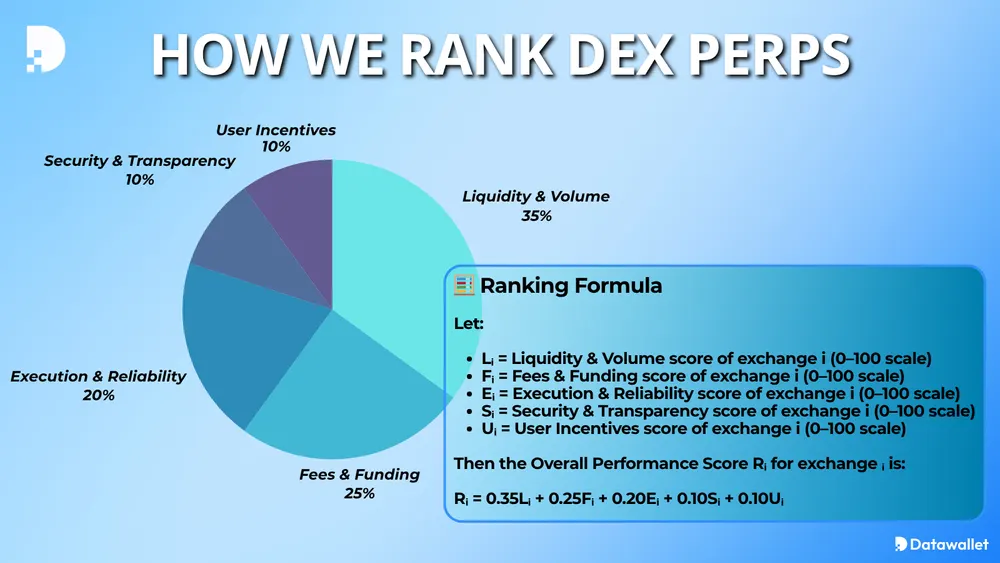
Best Perp DEXs in 2025
Based on the ranking criteria above, the following decentralized perpetual exchanges delivered the strongest performance across liquidity, volume, open interest, leverage, fees, and security.
Each platform offers on-chain perpetual trading with transparent pricing, verifiable funding rates, and auditable execution. The summary below outlines where traders are deploying capital in 2025 and which perp DEXs provide the best balance of liquidity and reliability.
1. EdgeX - The Leading Perps DEX in 2025
EdgeX ranks among the highest-volume decentralized perpetual exchanges in 2025, combining near-CEX execution with full on-chain settlement. Built by former engineers from Binance, Bybit, and Morgan Stanley, its Ethereum Layer-2 processes over 200,000 orders per second with sub-10 ms latency, averaging $4.5 billion in daily trading volume and $1 billion in open interest.
Its architecture combines a Settlement Layer for Ethereum-based custody, a Match Engine Layer with advanced tools like trailing TP/SL and 100x leverage, and a Hybrid Liquidity Layer that aggregates liquidity across chains for tight spreads and minimal slippage.
EdgeX’s points program converts trading activity into tokenized equity rewards, aligning trader participation with protocol growth. With low maker/taker fees and verifiable on-chain metrics, it has become a benchmark for high-performance decentralized derivatives.
EdgeX Platform Highlights:
- Fees: Maker 0.012%, taker 0.038%, with VIP tiers as low as 0.000% / 0.024%.
- Assets: 150+ perpetual pairs including BTC, ETH, SOL, and BNB.
- Deposit Methods: USDT via MetaMask, WalletConnect, and other Web3 wallets.
- Leverage: Up to 100x across all contracts.
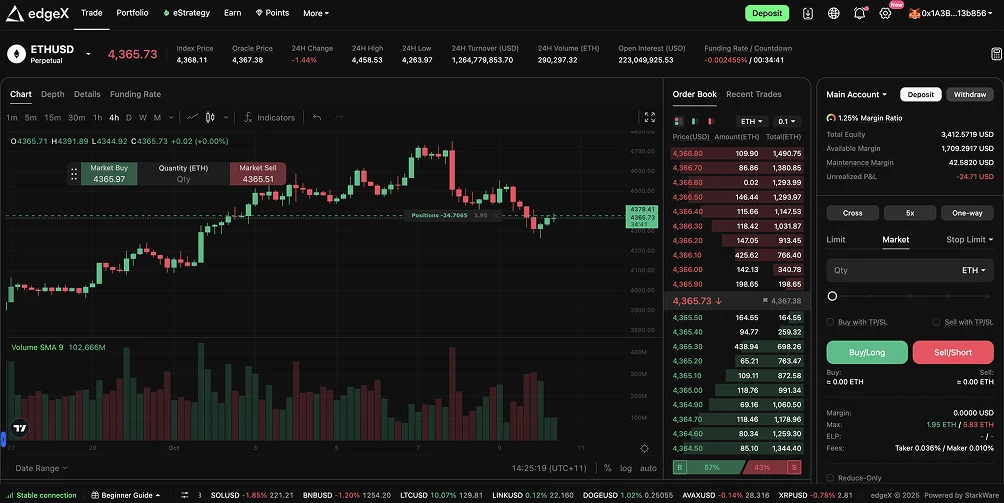
2. Hyperliquid - Most Liquid Decentralized Perp Exchange
Hyperliquid stands as the most liquid decentralized perpetual exchange, surpassing $2 trillion in cumulative trading volume across 100+ markets. Operating on a custom Layer-1 blockchain powered by HyperBFT consensus, it delivers one-block finality and processes over 200,000 orders per second, rivaling centralized exchanges in speed and stability.
Its perpetuals use linear USDC margining with profits settled in USDT, removing conversion delays and simplifying trade execution. Traders benefit from 0% maker fees, rebates up to -0.003%, and a clear risk model with up to 40x leverage and fixed 50% maintenance margin.
Although Hyperliquid continues to lead in liquidity and execution quality, it has begun ceding share to rising competitors like EdgeX and Lighter, which attract users with aggressive rewards and token-based incentives. Even so, Hyperliquid’s unmatched liquidity depth, refined engine, and track record make it a cornerstone of the on-chain derivatives market.
Hyperliquid Platform Highlights:
- Fees: 0% maker fees, taker fees from 0.05%, rebates up to -0.003%.
- Assets: 100+ perpetual markets with $2T+ cumulative trading volume.
- Deposit Methods: USDC deposits via MetaMask, Coinbase Wallet, and other Web3 wallets.
- Leverage: Up to 40x, with fixed 50% maintenance margin.
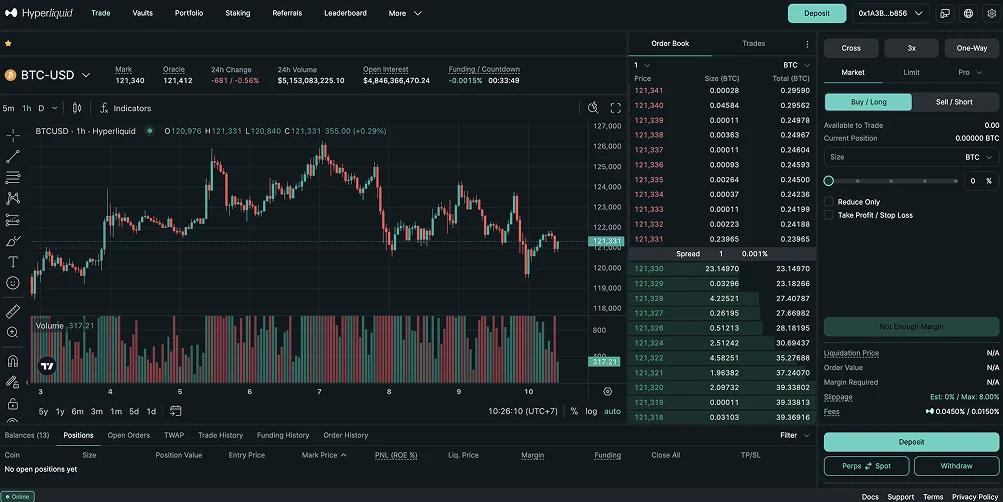
3. Lighter - Fastest Zero-Knowledge Perp DEX on Ethereum
Lighter is a zero-knowledge perpetual exchange on Ethereum built for verifiable, low-latency trading. Every order and liquidation is proven on-chain with zk proofs, ensuring transparency and fairness. Its custom zk engine handles tens of thousands of orders per second with millisecond latency, while users maintain full self-custody and secure exits through Ethereum.
Backed by Founders Fund and a16z, Lighter has emerged as a key competitor to EdgeX and Hyperliquid. It processes around $8.4B in 24h volume, $195B monthly, and holds roughly $2B in open interest, showing deep liquidity and strong HFT activity. Retail traders pay 0 fees, while Premium accounts for institutions offer ultra-low costs of 0.002% maker and 0.02% taker.
Its Points Program rewards active traders weekly with future token allocations, blending performance incentives with user ownership. With provable execution, zero-fee trading, and on-chain transparency, Lighter is becoming the third major player in decentralized perpetual markets.
Lighter Platform Highlights:
- Fees: 0 maker / 0 taker for retail; 0.002% maker, 0.02% taker for Premium accounts.
- Assets: Broad perpetual coverage across majors and long-tail tokens.
- Deposit Methods: Direct Ethereum L1 deposits and withdrawals.
- Leverage: Up to 50x on BTC and ETH, pair-specific limits on others.
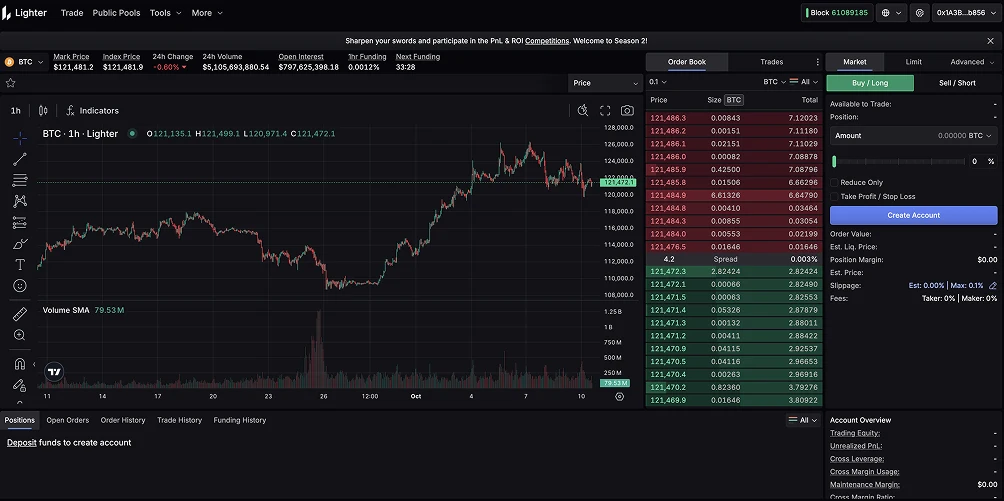
4. ApeX - Multi-Asset Perp DEX with Tokenized Stocks
ApeX Protocol is a zero-knowledge Layer-2 perpetual exchange offering multichain liquidity without bridging and gas-free trading at 10,000 TPS. It processes $3.7B in daily volume, $29B monthly, and holds about $126M in open interest, supporting 100x leverage across 45+ markets.
Beyond crypto, ApeX enables 24/7 trading of tokenized U.S. stocks like Apple and Tesla using USDT, with no KYC required. Features such as negative maker fees via Grid Bot, cross-margin accounts, and hourly funding enhance capital efficiency and market depth for active traders.
Its Token Buyback Program allocates up to 90% of revenue toward repurchasing and locking APEX tokens on-chain for three years, strengthening value and aligning incentives. Combined with the APE Points Program, ApeX positions itself as a community-driven, multi-asset DEX bridging traditional and on-chain finance.
ApeX Platform Highlights:
- Fees: 0.02% maker, 0.05% taker, with negative maker fees via Grid Bot.
- Assets: 45+ perpetual markets plus tokenized U.S. stocks.
- Deposit Methods: USDT and USDC via MetaMask and Web3 wallets.
- Leverage: Up to 100x on BTC and ETH, 50x on altcoins and tokenized assets.
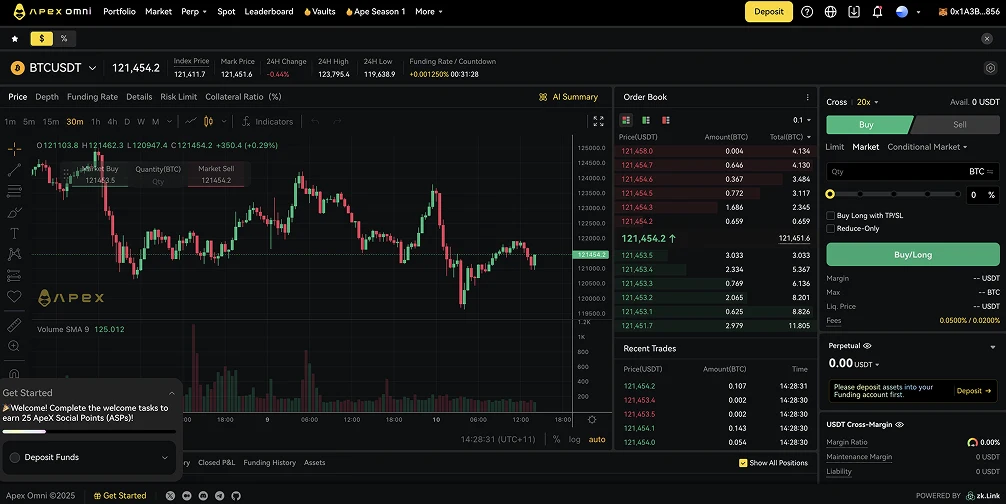
5. Aster - Binance-Backed High-Leverage Perp DEX
Aster is a Binance-backed perps DEX offering up to 1001x leverage, hidden orders, and MEV-free execution across BNB Chain, Ethereum, Solana, and Arbitrum. It claims over 2 million users and around $10B in daily trading volume on its frontend, though it has reported figures as high as $100B, leading DefiLlama to delist its data over transparency concerns.
Formed through the merger of Astherus and APX Finance, Aster combines a professional Pro Mode with cross-margin trading and a Simple Mode for one-click execution via its ALP liquidity pool. It also supports stock perpetuals on Apple and Tesla with up to 50x leverage, and a Degen Mode that removes opening fees for ultra-high-risk trades.
Backed by YZi Labs and linked to Binance founder CZ, Aster’s growth has drawn both attention and skepticism. Its extreme leverage, multi-chain support, and ambitious token ecosystem set it apart, but true credibility will depend on verifiable on-chain data confirming its reported volumes.
Aster Platform Highlights:
- Fees: 0.01% maker, 0.035% taker; zero open fees in Degen Mode.
- Assets: Crypto, forex, and stock perpetuals across four blockchains.
- Deposit Methods: USDT via MetaMask, Binance Wallet, and other Web3 wallets.
- Leverage: Up to 1001x on BTC, 250x on ETH, 200x on forex, and 50x on stocks.
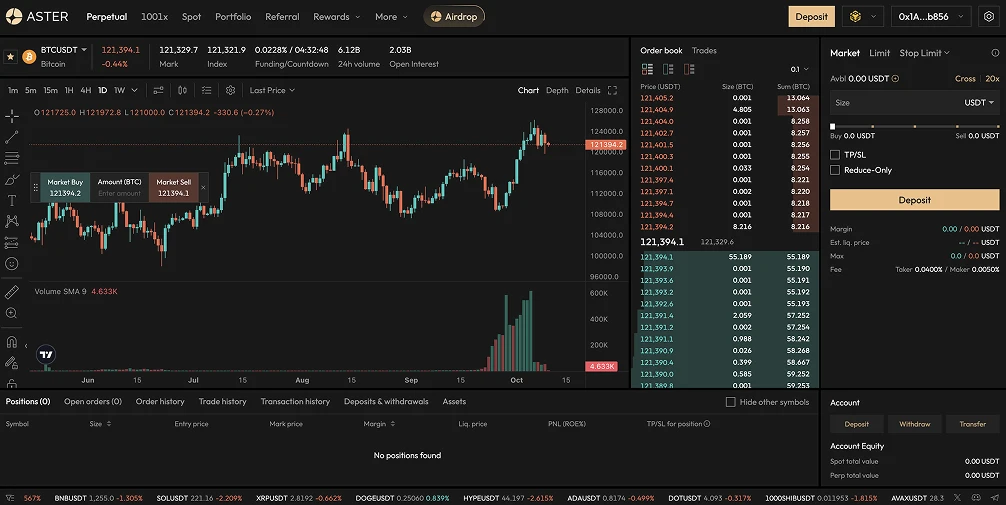
6. Drift Protocol - Best Solana-Based Perp DEX
Drift Protocol is the top perpetual futures exchange on Solana, processing about $300M in daily volume, $11B monthly, and maintaining $600M in open interest. Built natively on Solana, it delivers sub-second transaction speeds and low fees, making it a strong choice for active perpetual traders.
Drift uses a hybrid liquidity model combining a decentralized order book (DLOB), automated market maker (AMM), and Just-in-Time (JIT) liquidity auctions to ensure deep markets and low slippage. It supports cross-margin trading, accepts over 20 collateral tokens, and offers yield through its Backstop AMM Liquidity (BAL) program.
While less liquid than some competitors, Drift excels in execution precision, Pyth oracle pricing, and advanced order types like Oracle Limit and Protected Maker Orders. With reliable settlement, strong risk controls, and a growing Solana-native community, Drift remains the benchmark for decentralized derivatives on Solana.
Drift Platform Highlights:
- Fees: Maker rebates up to -0.01%; taker fees 0.03%–0.10%.
- Assets: 40+ perpetual markets including BTC, ETH, SOL, APT, and ARB.
- Deposit Methods: SOL, USDC, and 20+ collateral tokens.
- Leverage: Up to 20x on major markets; up to 101x in High Leverage Mode.
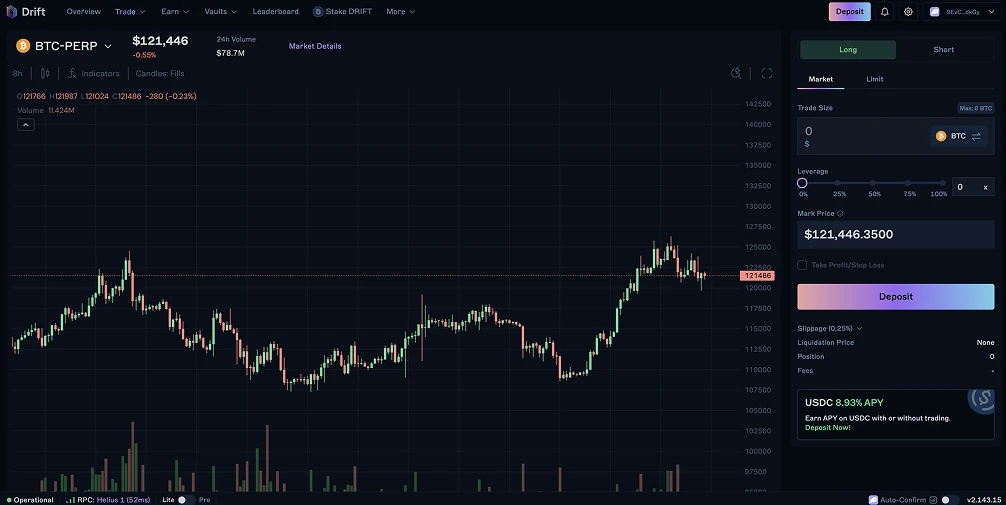
7. dYdX - Longest-Running Decentralized Perp Exchange
Founded in 2017 by former Coinbase engineer Antonio Juliano, dYdX is DeFi’s longest-running and most battle-tested perpetual exchange. It processes around $270M in daily volume, $11B monthly, and holds about $170M in open interest, supported by over $1.4T in lifetime trading volume and a spotless security record.
Powered by the Cosmos-based dYdX Chain, it runs a fully decentralized order book and matching engine that provides transparent, validator-driven settlement. Traders can access 220+ perpetual markets with up to 50x leverage, advanced order types, and full cross-platform functionality across web, mobile, and API.
Its fee structure includes maker rebates up to -0.011% and taker fees from 0.05%, reduced for high-volume accounts. Seasonal programs like Surge Season 7 and affiliate rewards drive consistent participation. While newer exchanges innovate on UX, dYdX remains the benchmark for stability, transparency, and credibility in decentralized perpetual trading.
dYdX Platform Highlights:
- Fees: Maker rebates up to -0.011%; taker fees from 0.05%.
- Assets: 220+ perpetual markets including BTC, ETH, SOL, and XRP.
- Deposit Methods: USDC via MetaMask and EVM-compatible wallets.
- Leverage: Up to 50x on BTC and ETH; 10x on major altcoins.
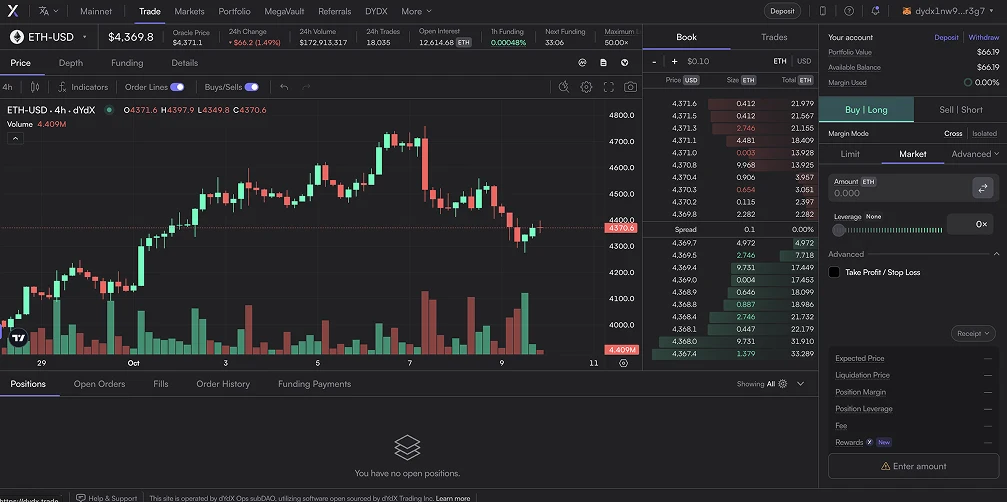
Decentralized Perpetual Exchanges Explained: AMMs vs CLOBs
Decentralized perpetual exchanges are on-chain trading platforms that let users speculate on crypto prices without intermediaries or custody risk. Unlike traditional futures, perpetual contracts never expire and use a funding rate to stay aligned with spot prices.
Early perp DEXs relied on automated market makers (AMMs) like GMX, where pooled liquidity handled trades but limited precision and scalability. The new generation uses central limit order books (CLOBs), seen in EdgeX, Hyperliquid, and Lighter, which match buyers and sellers directly and require high-throughput blockchains to process thousands of orders per second.
Since 2022, decentralized perp exchanges have processed over $8.6 trillion in cumulative volume, doubling in 2025 as CLOB-based models overtook AMMs. With real-time execution, transparent settlement, and user custody, these platforms now form the foundation of on-chain derivatives trading.
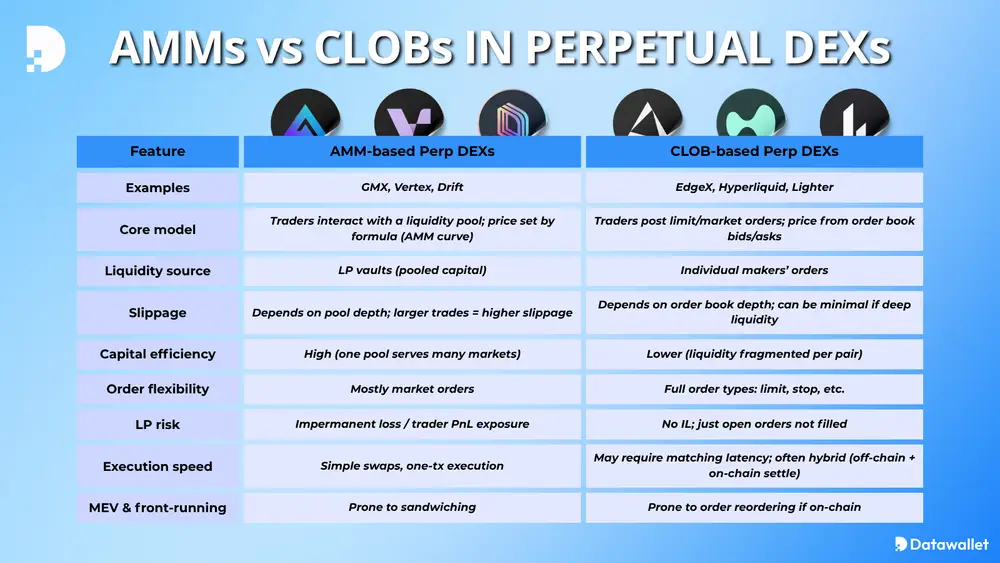
Perp DEX vs Perp CEX: Which Is Better for Traders?
Perpetual traders face a choice between centralized exchanges (CEXs) for convenience and decentralized exchanges (DEXs) for control. CEXs dominate liquidity, processing $5.4 trillion in Q1 2025, with Binance alone accounting for $2 trillion. Their deep order books and low slippage make them ideal for high-volume trading.
DEXs are closing the gap, growing their market share from 3.5% to 16.7% in the past year as high-performance platforms like EdgeX and Hyperliquid deliver near-CEX execution fully on-chain. They offer no KYC requirements, full self-custody, and transparent settlement, giving traders autonomy at the cost of managing their own wallets and security.
CEXs still lead in liquidity and user experience, but DEXs excel in transparency, privacy, and asset control. As infrastructure matures, decentralized perps are quickly catching up, signaling a shift toward self-sovereign trading in crypto.
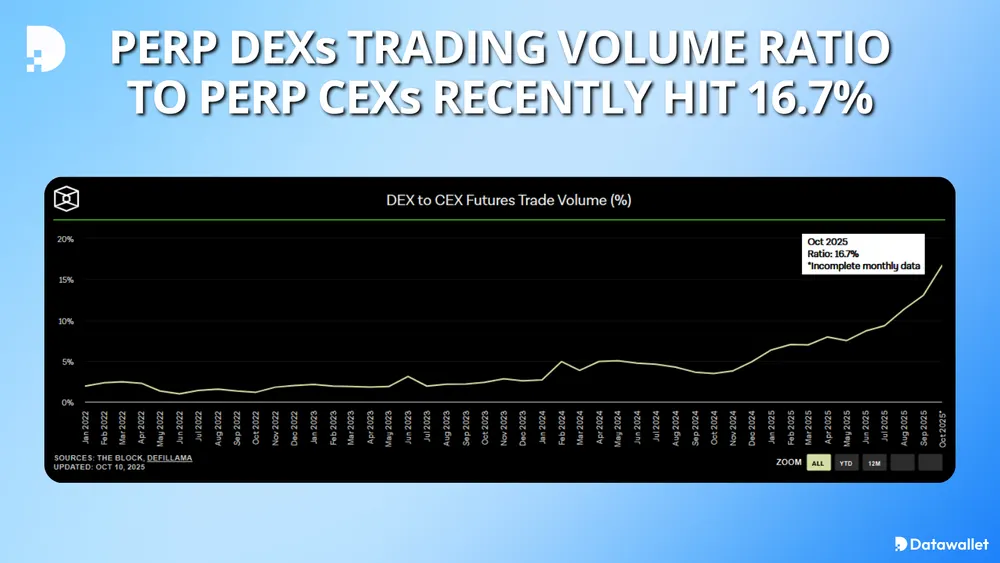
Trading Fees on Perp DEXs
Fees on decentralized perpetual exchanges directly affect profitability. The main costs traders face are trading fees, funding rates, liquidation fees, network fees, and slippage.
- Trading Fees: Perp DEXs charge maker fees for adding liquidity and taker fees for removing it. Aster charges a 0.01% taker fee ($20 on a $200K trade), while Drift offers 0% taker fees on BTC and ETH. Maker orders are cheaper, with Drift averaging $50 per $200K versus Aster’s $70. Placing limit orders helps qualify for maker rebates.
- Funding Rates: Funding rates align perp prices with spot markets through periodic payments between longs and shorts. On EdgeX, they update hourly and cap at ±0.05%, so a $10K long costs $5 per period at the max rate. Frequent funding payments can reduce long-term returns if unmanaged.
- Liquidation Fees: Triggered when margin falls below maintenance levels. On Drift, a $5K SOL-PERP at 10x leverage may liquidate after a 5% drop, reducing collateral to cover losses. Moderate leverage helps avoid liquidation.
- Network Fees: Vary by blockchain. GMX on Arbitrum averages $0.10–$0.20 per transaction, while Hyperliquid removes them entirely with zero network fees and instant execution.
- Slippage: Liquidity depth determines execution quality. High-liquidity DEXs like Hyperliquid and EdgeX keep spreads tight, while smaller venues face wider spreads and higher slippage.
Risks of Using Decentralized Perpetual Exchanges
Decentralized perpetual exchanges offer transparency and self-custody but come with notable risks that traders must manage carefully.
- Smart Contract Vulnerabilities: Even audited protocols can be exploited. GMX’s $42M incident highlighted how logic flaws can drain liquidity and disrupt markets.
- Liquidity and Liquidation Risks: AMM and peer-to-pool models expose liquidity providers to trader profits and sharp price swings. Sudden moves can deplete pools or trigger forced liquidations.
- Oracle and Price Manipulation: Exchanges using external oracles like Pyth or Chainlink risk latency or manipulation through flash loans and TWAP abuse, leading to inaccurate pricing or liquidations.
- MEV and Market Exploits: Front-running and sandwich attacks remain widespread. EigenPhi reports over 10,000 manipulated trades daily, causing roughly $14B in monthly losses.
- Cross-Chain and Governance Risks: Multi-chain and hybrid systems depend on bridges, keepers, and admin permissions. Failures or misconfigurations can freeze markets or allow unauthorized control.
- Regulatory and Recovery Limitations: DeFi perps operate under shifting regulations with minimal user protection. Post-hack recovery and insurance coverage are rare.
Final Thoughts
Decentralized perpetual exchanges are no longer experimental. They are redefining how traders access leverage, liquidity, and control.
The top platforms now rival centralized exchanges in speed and reliability while removing custodial risk. Success in this market depends on choosing exchanges with deep liquidity, transparent execution, and fair incentives.
Traders who learn funding dynamics, manage leverage carefully, and favor verifiable on-chain systems will be best positioned to capture the next wave of growth in crypto derivatives.
Frequently asked questions
Are perpetual futures regulated by authorities like the SEC, FCA, ASIC, or SFC?
Yes. The SEC and CFTC treat most perpetuals as unregistered derivatives, while the FCA bans crypto derivatives for retail users. ASIC and SFC require derivative licenses, and MiCA in the EU may soon regulate front-ends serving EU traders. Most on-chain DEXs remain unregulated but face rising regional scrutiny.
How do decentralized perpetual exchanges handle KYC requirements?
Most perp DEXs operate without formal Know Your Customer (KYC) checks because trades settle directly on-chain and user custody never transfers to an intermediary. However, interfaces that target regulated markets or use fiat on-ramps may apply KYC through wallet whitelisting or regional geoblocking. Regulation is tightening, and hybrid DEXs may soon require wallet-level verification under global AML standards.
What role do oracles play in pricing perpetual contracts on DEXs?
Price oracles such as Chainlink, Pyth, and Redstone feed live spot data to smart contracts so perpetual prices mirror the underlying market. Accurate oracle feeds are critical for fair funding rates, liquidation triggers, and preventing manipulation through delayed or spoofed price updates.
How do funding payments work on decentralized perpetual exchanges?
Funding payments balance perpetual prices with spot markets by transferring small fees between long and short positions. When perpetual prices trade above spot, longs pay shorts; when below, shorts pay longs. Rates usually reset hourly and vary by volatility, liquidity, and open interest.
%25201%2520(1).webp)
Written by
Emily Shin
Research Analyst
Emily is passionate about Web 3 and has dedicated her writing to exploring decentralized finance, NFTs, GameFi, and the broader crypto culture. She excels at breaking down the complexities of these cutting-edge technologies, providing readers with clear and insightful explanations of their transformative power.

.webp)
%2520(1).webp)

.webp)





